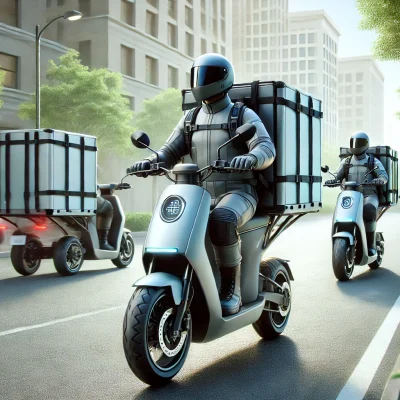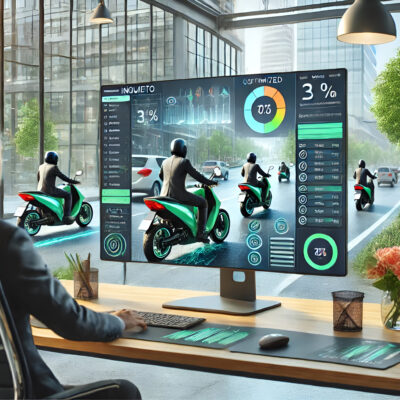The industrial sector is always changing. The incorporation of electric vehicles into the day-to-day running of factories is one of the most wide-spread innovations to date. Beyond their contribution to environmental sustainability, electric vehicles adapted for the industrial sector are proving to be versatile tools that offer practical solutions for a wide variety of applications within the production line.
Efficient internal transportation at manufacturing plants
Electric vehicles are transforming internal transportation between manufacturing plants. These vehicles, which are specifically designed to operate in industrial settings, are capable of moving effortlessly through production areas, transporting materials and products from one point to another efficiently.
The speed and agility of these vehicles contribute to optimising logistic processes within the plant, reducing bottlenecks and improving the fluidity of the production line. In addition, being electric, they reduce noise pollution and maintain a cleaner operation. In this way contributing to the improvement of work conditions for operators.
Technical assistance on wheels: mobile workshop and efficient maintenance
One of the most prominent applications of electric vehicles in the industrial sector is providing technical assistance on wheels. Mobile workshops equipped with state-or-the-art technology can move quickly across production facilities, reducing downtime and improving operational efficiency. These electric vehicles are designed to carry all the essential tools and equipment needed to address technical problems quickly and efficiently.
Imagine a scenario in which a machine critical to a production process experiences an unexpected malfunction. The solution to this setback, years ago, could have taken hours or even days. In contrast, with the mobility now provided by these alternative electric vehicles, technicians can reach the site of the breakdown in a matter of minutes, minimalizing downtime and ensuring a speedy recovery of production.
Adaptability for various applications
What is fascinating about electric vehicles in the industrial sector is their adaptability to cover diverse applications. From vehicles which are specialised for maintenance tasks to those designed to carry heavy loads, the wide range of options available offers specific solutions for the unique challenges faced by each industrial facility.
The ability to personalise these electric vehicles to meet the specific needs of a manufacturing plants provides invaluable flexibility. Whether you need a fleet of vehicles for transporting finished products or a special unit to maintain machinery, the versatility of electric vehicles makes them a perfect and efficient choice.
Examples of vehicles for the industrial sector
At the intersection between innovation and efficiency, specialised electric vehicles are taking industrial mobility to completely new heights. With models such as the Urban D80 electric motorbike, the Eezon E3 electric tricycle and the Cenntro Metro compact electric van, the industrial sector is undergoing a transformation that goes beyond sustainability to offer practical solutions tailored for various applications.
- Urban D80 electric motorbike
The Urban D80 electric motorbike has revolutionised internal transportation in the industrial sector thanks to its versatile and efficient applications. Specially designed for an industrial environment, this electric motorbike offers a sustainable and agile solution for moving personnel and small loads within industrial facilities. Its compact design and manoeuvrability allow for the easy navigation of confined spaces, optimising logistical efficiency in production environments.
Equipped with state-of-the-art batteries, the Urban D80 ensures reliable and emission-free performance which contributes to the reduction of the environmental footprint in industrial settings. In addition, its capacity for the adequate storage of tools and essential materials makes it an indispensable tool for the optimisation of internal processes, thus improving productivity and mobility within factories.

- Eezon E3 Electric Tricycle
When it comes to optimising internal transportation at manufacturing plants, the Eezon E3 electric tricycle stands out as a versatile option. With its ability to carry significant loads and exceptional manoeuvrability, this tricycle is the answer to logistical challenges within industrial facilities.
The Eezon E3 moves between machinery and work stations with ease, speeding up the production line. Its electric nature not only minimalizes sound pollution in the work environment, but it also offers a sustainable and efficient alternative for internal transportation of materials at the plant.
- Cenntro Metro compact electric van
The Cenntro Metro compact electric van epitomises the adaptability that electric vehicles can offer the industrial industry. From transporting finished products to maintaining machinery, the Cenntro Metro adapts to a variety of applications with ease.
Its compact design doesn’t take away from its ability to carry, something which makes it an ideal option for companies looking to optimise space without compromising efficiency. Equipped with state-of-the-art electric technology, the Cenntro Metro is a versatile solution for the ever-changing needs of a manufacturing plant.
What’s more, it is a perfect solution for mobile technical assistance. Its agile and compact design allows technicians to move quickly and easily around extensive industrial facilities, reaching critical points in record time. Imagine a technician moving effortlessly to a broken-down machine with all the necessary tools on board. The Cenntro Metro not only optimises response time, but also provides a sustainable solution for technical assistance in industrial environments.
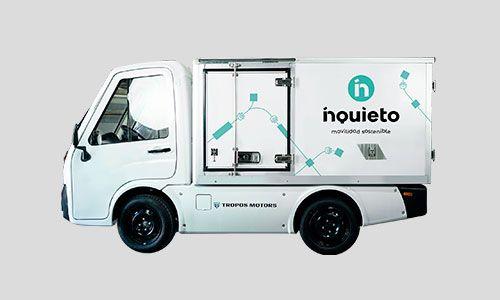
Ultimately, electric vehicles are not only revolutionising mobility on our roads, but they are also leaving a significant mark in the industrial sector. Beyond their environmental benefits, these vehicles offer practical solutions to specific challenges, from mobile technical assistance to efficient internal transportation at manufacturing plants. By adopting this technology, companies are not only boosting sustainability, but they are also improving operational efficiency and agility in an ever-evolving industrial world.
